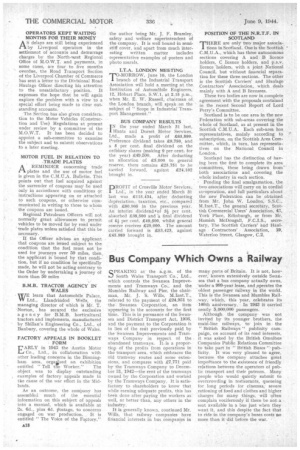Bus Company Which Owns a Railway
Page 20

If you've noticed an error in this article please click here to report it so we can fix it.
QPEA.KING at the a.g.m. of the kJ South Wales Transport Co., Ltd., which controls the Swansea Improve-ments and Tramways Co., and the Mumbles Railway and Pier, the chairman, Mr. J. S. Wills, M.Inst,T., referred to the payment of £24,931 to the Swansea Corporation, an item appearing in the accounts for the first time. This is in pursuance of the Swansea and District Transport Act, 1936, and the payment to the Corporation is in lieu of the rent previously paid by the Swansea Improvements and ,Tramways Company in tweet of the abandoned trafriways. It. is a proportion of the profits from operations in the transport area, which ernbraces the old tramway routes and some exteasions, and compares with £7,771 paid by the Tramways Company to December 31, 1942—the rent of the tramways
• owned by the Corporation and worked by the Tramways Company, It is satisfactory to shareholders' to know that while earning adequate profits, this has been done after paying the workers as well, or better than, any others' in the industry.
It is generally known, continued Mr. Wills, that railway companies have financial interests in bus companies in many pans of Britain, It is not, however,' known extensively outside Swansea that a bus company actually owns, Under a 999-year lease, and ,operates the oldest passenger railway, in the world. This is the Swansea and Mumbles Rail'way, which, this year, celebrates its 140th anniversary. In 1943 it carried nearly 5,000,000 passengers.
Although the company was not invited by its younger brothers, the main-line railways, to join in the " British Railways '' publicity campaign, on account of its road interests, it was asked by the British Omnibus Companies Public Relations Committee to take part in "British Buses "-publicity. it was very pleased to agree, because, the company attaches great importance to the existence of friendly relations between the operators of public transport and their patrons. Many people who would quietly submit to overerowding in restaurants, queueing for long periods for cinemas, severe rationing of food and clothes and higher charges for many things, will often complain vociferously if there be not-a seat available in a bus just when they want it, and this despite the fact that to ride in the company's buses costs no more than it did before the war.




















































